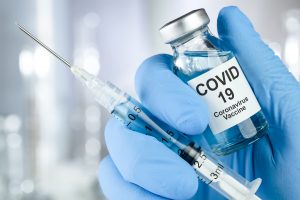Nelson Capital Management


The large pharmaceutical industry (aka “Big Pharma”) is an increasingly challenging subsector of healthcare. Companies that were once considered “steady Eddies” with predictable cash flow and generous, reliable dividends are now pivoting to emphasize growth. These companies are investing in and acquiring new (and more expensive) drugs, particularly in oncology. While this strategy might possibly lead to higher growth and higher margins, it is also riskier than the traditional Big Pharma approach. We sold Pfizer (tkr: PFE) because their dramatic change in strategy did not fit with our overall healthcare sector investments. After careful consideration, we decided to buy GlaxoSmithKline (tkr: GSK). This pharmaceutical company maintains a more balanced and broader product portfolio as well as a wider geographic reach than many of its competitors.
 GlaxoSmithKline is headquartered in Great Britain and employs over 95,000 people globally. 55% of its sales are from pharmaceutical products, with an increasing emphasis in oncology. GlaxoSmithKline recently acquired a company called Tesaro, which brought with it a medicine called Zejula. Zejula is already approved to treat advanced ovarian cancer in the U.S. and Europe. The drug is being evaluated for use in other solid tumors as well. Vaccines constitute 20% of sales. Shingrix, GlaxoSmithKline’s new shingles vaccine, has been a major growth driver in the last year. This vaccine, which requires two doses, represents a dramatic improvement in the prevention of shingles and post-herpetic neuralgia in people older than 50, with over 90% effectiveness for both indications. GlaxoSmithKline also makes and sells Bexsero, a vaccine aimed at preventing a particular type of bacterial meningitis. Vaccines require considerable technical expertise to manufacture and are not subject to generic competition, which makes them not only a big contributor to public health, but also a strong source of ongoing revenue. GlaxoSmithKline’s consumer healthcare division generates 25% of revenues. Last year, GSK and Pfizer struck a deal to combine their consumer healthcare portfolios, with GSK owning two-thirds and Pfizer owning one-third. The goal is to improve margins and cut operating costs over the next two years, then spin the division off. The new company will have estimated revenues of $13 billion.
GlaxoSmithKline is headquartered in Great Britain and employs over 95,000 people globally. 55% of its sales are from pharmaceutical products, with an increasing emphasis in oncology. GlaxoSmithKline recently acquired a company called Tesaro, which brought with it a medicine called Zejula. Zejula is already approved to treat advanced ovarian cancer in the U.S. and Europe. The drug is being evaluated for use in other solid tumors as well. Vaccines constitute 20% of sales. Shingrix, GlaxoSmithKline’s new shingles vaccine, has been a major growth driver in the last year. This vaccine, which requires two doses, represents a dramatic improvement in the prevention of shingles and post-herpetic neuralgia in people older than 50, with over 90% effectiveness for both indications. GlaxoSmithKline also makes and sells Bexsero, a vaccine aimed at preventing a particular type of bacterial meningitis. Vaccines require considerable technical expertise to manufacture and are not subject to generic competition, which makes them not only a big contributor to public health, but also a strong source of ongoing revenue. GlaxoSmithKline’s consumer healthcare division generates 25% of revenues. Last year, GSK and Pfizer struck a deal to combine their consumer healthcare portfolios, with GSK owning two-thirds and Pfizer owning one-third. The goal is to improve margins and cut operating costs over the next two years, then spin the division off. The new company will have estimated revenues of $13 billion.
GlaxoSmithKline’s research focus areas include the immune system, genetics and advanced technologies. Given the COVID-19 epidemic sweeping the globe, the company’s vaccine expertise looks like a strong bet as more emphasis is placed on prevention of viral diseases. The company’s stock was also attractively valued, with a price-to-earnings ratio slightly lower than its peers and a dividend slightly higher, at 4.5%. While the market is certainly in a state of turmoil right now, people will still need medicines and GlaxoSmithKline should be able to maintain steady cash flow to service its debt and support its dividend.
Individual investment positions detailed in this post should not be construed as a recommendation to purchase or sell the security. Past performance is not necessarily a guide to future performance. There are risks involved in investing, including possible loss of principal. This information is provided for informational purposes only and does not constitute a recommendation for any investment strategy, security or product described herein. Employees and/or owners of Nelson Roberts Investment Advisors, LLC may have a position securities mentioned in this post. Please contact us for a complete list of portfolio holdings. For additional information please contact us at 650-322-4000.
Receive our next post in your inbox.